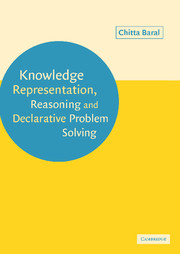Book contents
- Frontmatter
- Contents
- Preface
- 1 Declarative programming in AnsProlog*: introduction and preliminaries
- 2 Simple modules for declarative programming with answer sets
- 3 Principles and properties of declarative programming with answer sets
- 4 Declarative problem solving and reasoning in AnsProlog*
- 5 Reasoning about actions and planning in AnsProlog*
- 6 Complexity, expressiveness, and other properties of AnsProlog* programs
- 7 Answer set computing algorithms
- 8 Query answering and answer set computing systems
- 9 Further extensions of and alternatives to AnsProlog*
- Appendix A Ordinals, lattices, and fixpoint theory
- Appendix B Turing machines
- Bibliography
- Index of notation
- Index of terms
9 - Further extensions of and alternatives to AnsProlog*
Published online by Cambridge University Press: 13 August 2009
- Frontmatter
- Contents
- Preface
- 1 Declarative programming in AnsProlog*: introduction and preliminaries
- 2 Simple modules for declarative programming with answer sets
- 3 Principles and properties of declarative programming with answer sets
- 4 Declarative problem solving and reasoning in AnsProlog*
- 5 Reasoning about actions and planning in AnsProlog*
- 6 Complexity, expressiveness, and other properties of AnsProlog* programs
- 7 Answer set computing algorithms
- 8 Query answering and answer set computing systems
- 9 Further extensions of and alternatives to AnsProlog*
- Appendix A Ordinals, lattices, and fixpoint theory
- Appendix B Turing machines
- Bibliography
- Index of notation
- Index of terms
Summary
So far in the book we have considered sub-classes of AnsProlog* which have been well-studied in the literature and two additional extensions AnsPrologsm and AnsPrologdlv which are the input language of the answer set computing systems Smodels and dlv. There have been several additional proposals for extending AnsProlog*, which are not that well-studied. Also, there have been many alternative proposals to characterize programs in the syntax of AnsProlog* and its sub-classes. In this chapter we give a brief overview of the above two aspects.
Some of the extensions that we consider are: (i) enriching the rules by allowing not in the head of rules, (ii) allowing nesting in the head and body of rules; (iii) allowing additional operators such as knowledge and belief operators; (iv) enriching the framework by allowing abduction; (v) allowing explicit specification of intent to use domain closure and its impact on the universal query problem; (vi) allowing set constructs; and (vii) allowing specification preferences between rules of a program.
In regard to alternative characterizations of programs in the syntax of AnsProlog* and its sub-classes, we focus mostly on AnsProlog and AnsProlog¬ syntax, and the well-founded semantics. In the process we define notions such as the 3-valued stable models, and stable classes which are related to both the well-founded characterization and the answer sets. We also briefly discuss the framework of argumentation which can be used in defining both answer sets and the well-founded characterization of programs in AnsProlog syntax.
Information
- Type
- Chapter
- Information
- Publisher: Cambridge University PressPrint publication year: 2003
